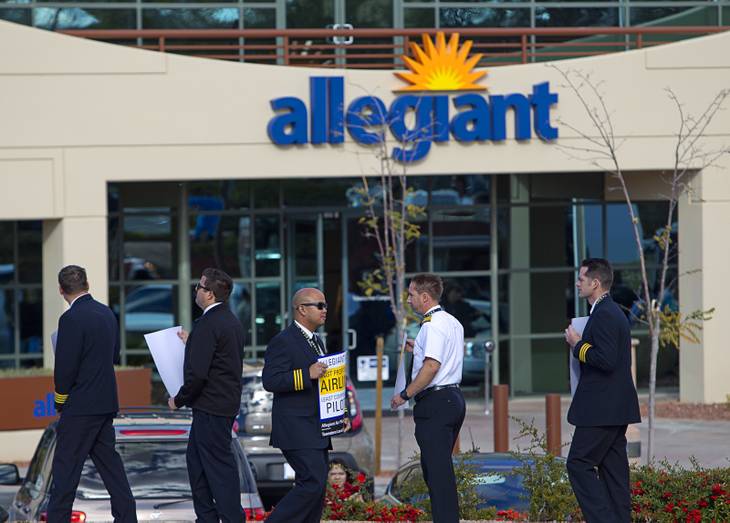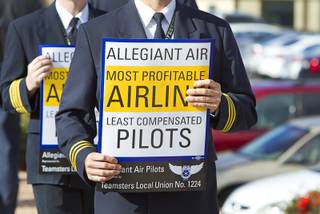When a federal judge put the kibosh on Allegiant Air pilots’ attempted strike last week, just hours after they called it, the aviators were left in a tricky spot.
They deployed a union’s most powerful negotiating weapon — threatening to walk off the job and shut company operations down — but the bomb was a dud.
Allegiant claimed victory, and planes flew as scheduled. Now, as a court hearing looms Friday morning, the James Hoffa-led pilots union is regrouping and still promising to ground aircraft, in a labor spat that shows no signs of getting resolved anytime soon.
U.S. District Judge Gloria Navarro last Wednesday granted Las Vegas-based Allegiant a temporary restraining order against Teamsters Local 1224, which represents the pilots and had announced they would walk off the job Thursday.
The strike could have canceled more than 250 flights that day, the union said, affecting 33,000 passengers, though it would have barely dented overall U.S. air traffic.
Still, after Allegiant sued the union last week, alleging a strike is illegal and would cost the airline millions of dollars per day, Navarro tabled the pilots’ plans. She ordered the union and its members not to encourage or participate in “any strike, work stoppage, picketing, sick-out, slow-down, work-to-rule campaign” or other move that would disrupt Allegiant’s regular operations.
The union said it would comply with the ruling, saying the strike was “on hold.”
U.S. labor law makes it very difficult for airline pilots to strike, and such walkouts are rare. But if Allegiant aviators now view the courts as another adversary in the dispute, Navarro’s ruling will not deflate them, labor consultants say.
Instead, it “could solidify the ‘world-against-us’ kind of attitude,” Mark Portnoy, a labor-relations consultant in Syosset, N.Y., said.
A strike is “the only powerful thing” a union has, and despite the ruling, Allegiant pilots can find ways around it, Ricardo Torres, a labor consultant in suburban Detroit, said.
Pilots can band together without official direction from their union to call in sick at peak travel times; bash Allegiant in the press; or work with other unions to discourage passengers from flying with the company, said Torres, a former strike director who now works with executives to, as his website says, keep companies “union free.”
“They want to come out with the impression that they’re powerful, and if you don’t deal with us, we’ll affect your bottom line,” Torres said.
Local 1224 President Daniel Wells said the ruling was not a dud for the union, as it “did nothing more than validate” pilots’ complaints about Allegiant, a discount carrier known for cheap fares, lots of add-on fees and steady profits.
Moreover, the union knew there was a risk that a judge could halt a strike, he said. Pilots aren’t questioning the decision to call a walkout and still are ready to go on strike at any moment, he said.
“The members are probably never stronger or more unified and more angry” than now, Wells, a captain with Atlas Air, said.
Allegiant’s pilots are fighting to restore what they say are better benefits and a better scheduling system that were scrapped a few years ago after they joined the Teamsters. They still don’t have a contract under the union, either.
Navarro’s order, meanwhile, saved many people’s travel plans to and from Las Vegas and other cities, and was particularly sweet news for top boss Maurice “Maury” Gallagher, majority owner and CEO of the airline’s parent, Allegiant Travel Co.
In 2011, the year before his pilots signed on with the Teamsters, Gallagher reportedly said unionization “is one of those things that clogs the arteries and makes you less quick and not as nimble.”
Overall, the fight has little impact on most American fliers. Allegiant, which shuttles leisure travelers from small, underserved cities to warm-weather vacation spots, flew 8 million passengers nationally last year, just 1.2 percent of all U.S. air traffic, according to U.S. Department of Transportation data.
It had an average 157 scheduled weekly flights to and from McCarran International Airport in March, comprising 4.8 percent of Las Vegas’ total passenger flights.
If its pilots stopped coming to work, Allegiant could lose millions of dollars a day in lost revenue. A strike also would erode the airline’s standing with passengers, who “would certainly be less likely to fly Allegiant in the future,” the company said in court papers last week.
Allegiant pilots voted in mid-January to authorize a strike, with 98 percent in favor. A small number of company pilots are not Teamsters members, but likely every pilot with Allegiant would have gone on strike last week.
“Even the thought of crossing the picket-line is a death knell for your career,” Wells, the union leader, said.
The last pilot strike at a major U.S. carrier was in 2010, when Spirit Airlines’ 2,600 aviators stopped working for five days, according to BloombergBusiness.
The labor law covering airlines, oddly the Railway Labor Act, calls for mediation and other negotiation steps before workers can go on strike. It even allows the White House to intervene and prevent a walkout.
That’s because interstate commerce and travel is critical to the country, and a strike could throw a far bigger wrench in the economy than, say, if retail clerks or auto workers walked off the job.
Some companies can just sell stockpiled inventory during a labor dispute, but “a trip that’s canceled is one that can’t be easily redone,” said professor Thomas Kochan, co-director of MIT’s Sloan Institute for Work and Employment Research.
“There is a feeling that there are real losses here for everybody involved,” he said of an airline strike.

